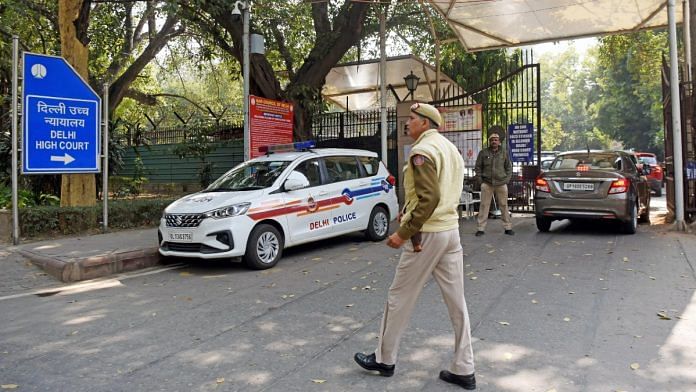New Delhi: The Income Tax department has “substantial and concrete evidence” to initiate reassessment proceedings, the Delhi High Court said Friday, dismissing a challenge by the Congress party to a reassessment of its tax liabilities for assessment years 2014-15, 2015-16 and 2016-17.
The division bench of Justices Yashwant Varma and Purushaindra Kumar Kaurav was dealing with three writ petitions moved by the Indian National Congress (INC) in this regard.
In rejecting the challenge, the bench said there were several unaccounted transactions in the Congress’s accounts and that tax authorities had “substantial and concrete evidence” to initiate reassessment proceedings.
Reassessment refers to the power of the Income Tax department to review the tax payable during a particular assessment year if it believes that certain income has not been subject to the prescribed tax.
Tax authorities maintain that material on record is sufficient to show that the “escaped” income of the Congress party is upwards of Rs 520 crore.
With regard to the material against the Congress, the court noted several transfers to the political party which were unaccounted for and details of disbursements made to political parties. There are “detailed references” to unaccounted transactions relating to several elections and payments made by government departments, liquor manufacturers, industry entities etc.
“The material which is taken note of in the Satisfaction Note makes detailed references to unaccounted transactions with respect to the Lok Sabha Elections 2019, MP (Madhya Pradesh) Assembly Elections 2018 and MP (Madhya Pradesh) Assembly Elections 2013,” the bench observed.
A satisfaction note is a document prepared by the assessing authority and retained on file for the purpose of recording observations made during the assessment process.
In its order, the high court noted: “There is a detailed reference to payments allegedly made to MPs/MLAs and candidates.”
Refusing to interfere with the tax proceedings, the bench said that the officer had followed the Income Tax Act, 1961, which has special provisions that allow the assessing officer to reopen proceedings for reassessment.
The Congress party, said the bench, chose to approach the court after a one-year delay, “only a few days before the time for completion of assessment would expire and at the proverbial fag end of the proceedings”.
Also Read: ‘Violates secularism’: Why HC declared UP Board of Madarsa Education Act unconstitutional
Principle of ‘unreasonable delay’
Senior Counsel Abhishek Manu Singhvi, appearing for the Congress, argued that there was an “inordinate delay” in initiation of the tax proceedings, and that the same should be set aside since the proceedings themselves were initiated at a delayed stage.
Singhvi submitted that precedents require reassessment proceedings to be initiated “immediately after”.
However, the court refused to entertain the same, and said that the principle was instead one of “unreasonable delay”, which means that the proceedings need not have been initiated immediately after but without unreasonable delay – which, the court found, was not the case here.
“It (the case pointed out by Singhvi) thus appears to have taken the position that as long as proceedings are initiated within a reasonable period from the closure of assessment of the searched person, a failure to take immediate action would not be fatal to the assessment,” the court said.
“What appears to have been frowned upon (in the case pointed out by Singhvi) is inordinate delay,” it added.
Singhvi also contended that the proceedings could not have been initiated as they were outside the time period permitted under Section 153A of the said act, which empowers an assessing officer to initiate reassessments.
“It would thus be wholly incorrect to read the First Proviso to Section 153C of the Act as constituting a bar of limitation or disabling the respondents from initiating assessment/reassessment for the entire block period of ten assessment years,” the court observed.
It added that according to the provision, material gathered was sufficient for tax authorities to initiate a reassessment of income of previous years. There was no bar to their power to carry out such an assessment, it held.
Justices Varma and Kaurav also said that the “satisfaction note” clearly demonstrated that there was sufficient evidence to open such a reassessment against the Congress party.
“However, and on a prima facie examination, it is evident that the respondents appear to have collated substantial and concrete evidence warranting further scrutiny and examination under the act,” the bench said.
At the same time, the court added that it was refraining from reproducing the “satisfaction notes” so that no prejudice is caused to the parties as they contain confidential and sensitive information.
Singhvi also contended that the provision requires the authorities to refer to the specific incriminating material against the accused, which was not done in the case. However, the Court did not accept the allegation and noted instead that the satisfaction notes contained sufficient incriminating material as required by provisions of the Income Tax Act, 1961.
(Edited by Amrtansh Arora)
Also Read: ‘He is defying Supreme Court’ — what SC said on TN governor’s refusal to induct Ponmudi into cabinet




Court should impose ₹1000 crores fine on Congress for filing petitions and wasting court’s time.